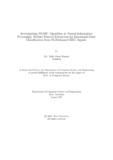Investigating music algorithm in neural information processing: robust feature extraction for emotional state classification from multichannel EEG signals

View/Open
Date
2021-08Publisher
Brac UniversityAuthor
Hossain, Md. Sakib AbrarMetadata
Show full item recordAbstract
The major challenge in any electroencephalogram (EEG) classi cation task lies with
in the dilemma of feature extraction, as raw time series signal provide little correlated
information, yet it holds colossal varieties of hidden feature patterns. Frequency
domain transformations are considered state of the art to tackle such complexity.
Nevertheless such conventional feature extraction techniques for instance; discrete
wavelet transformation (DWT), short time Fourier transform (STFT), di erential
entropy or classical non-parametric power spectral density (PSD) estimation models
are computationally expensive as they demonstrate high computational complexity
and extensive run time. Consequently arti cial intelligence driven multi channel
EEG based systems struggles to process neural information in real time and such
barrier minimizes the dynamics of relevant human computer interaction (HCI) and
brain computer interaction (BCI) applications. Multiple Signal Classi cation Algorithm
(MUSIC) is an eigen decomposition based parametric PSD estimation model,
which solely uses linear transformation rather than computing windowed periodigram
from autocorrelted function of the targeted signal for transformation. Hence
MUSIC algorithm should demonstrate lesser time complexity and run time than
contemporary classical non-parametric PSD models. Nevertheless this particular
model is relatively unexplored for such feature extraction task speci cally in the
area of emotion recognition, as the model is di cult to implement in terms of EEG
signals which demonstrate random behaviour. Our research investigates the performance
of MUSIC algorithm in feature extraction task for emotion recognition from
multi channel EEG signals and compares its performance with conventional classical
non parametric models. It also clari es the complexity in subspace estimations for
EEG waveforms through in detailed analysis, which are indispensable parameters
for implementing any eigen decomposition based models in such particular cases.
Our proposed model derived state of the art 5-fold cross validation accuracies of
97% and 97:4% for Multi Layer Perceptron (MLP) network and Hybrid Long Term
Short Memory (LSTM)-MLP network, respectively on the SEED emotional dataset.
The proposed MUSIC model optimizes 95%96% run time comparing with conventional
classical non-parametric techniques for feature extraction. With exceptional
0:01 sec: machine speci c run time for feature extraction task, the proposed model
shows great prospect in real time applications. Network performance and advanced
visualization techniques demonstrate the MUSIC model based feature space holds
signi cant superiority over non-parametric model generated feature space. Additionally
the research also found extensive
aws in the widely popular SEED dataset,
which were ignored in previously. Over 17% trials were found to hold multiple corrupt
channel resulted from external artifacts, which should have e ected previously
conducted researches. Our research also discusses the e ects of such
awed trial in
network performance.
